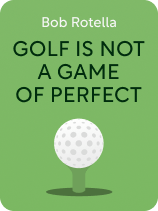

This article is an excerpt from the Shortform book guide to "Golf Is Not a Game of Perfect" by Bob Rotella. Shortform has the world's best summaries and analyses of books you should be reading.
Like this article? Sign up for a free trial here.
What’s the best way to get into the right mindset for golf? Why should you take a pragmatic approach to golf?
In Golf Is Not a Game of Perfect, Bob Rotella recommends that you take a pragmatic approach to your play. Specifically, to elevate your game, focus on short shots and choose easy shots.
Here are Rotella’s golf mindset tips for playing pragmatically.
1. Focus on Approach Shots
Rotella argues that to get into the right golf mindset, you need to make the most of your practice time improving your short game. While it’s tempting to focus on relatively flashy long irons and drives, the shots that will save you the most strokes over the course of the round are the shots you take near the green, from max-range wedge shots to chipping from the edge of the green, and everything in between. Rotella argues that improving your mechanics on these shots will improve your scores faster than any other course of practice.
(Shortform note: In addition to having a relatively small impact on your score, long shots may also be more difficult to perfect in practice. Experts argue that for many golfers, trying to perfect tee shots may be a waste of time, as it takes a lot of time and natural ability that most people don’t possess. By contrast, these experts note that because the short game doesn’t rely on physical strength or the complicated mechanics of a full swing, even casual golfers can improve their short games with a little practice.)
While Rotella recommends that you spend a lot of time practicing short shots, he notes that it usually isn’t beneficial to spend a lot of time practicing putting, as he believes that putting is more mental than mechanical.
2. Select Easy Shots
In addition to pragmatically focusing on short shots, Rotella recommends that you choose easy shots whenever possible, as you’re likely to feel more confident and relaxed when you take low-difficulty shots, which increases the likelihood that you’ll be able to hit the ball well. By contrast, when you choose more difficult shots, your perception of the shot’s difficulty can cause your confidence to waver, which can negatively affect your swing.
For example, suppose you’re a long way from the hole on your second shot on a par four. You’re torn between wanting to play a conservative shot that sets you up for an easy chip on, or more riskily trying to aim for the green, which you know is on the edge of your maximum range. In this scenario, Rotella recommends you choose the setup shot, as it’s easier and will make you feel more confident. On the other hand, if you aim for the riskier strategy and shoot for the green, your anxiety about the shot’s difficulty might lead you to take a bad swing.
(Shortform note: To choose easier shots, remember that certain types of shots are more mechanically complicated than others. Golf experts assert that chip shots are easier than pitches and putts are easier than chips. These experts argue that because of the relative mechanical simplicity of putts and chips, most golfers are much more consistent when hitting these types of shots. Whenever possible, choose a mechanically simple shot, as it will often be easier and more consistent than the alternatives.)

———End of Preview———
Like what you just read? Read the rest of the world's best book summary and analysis of Bob Rotella's "Golf Is Not a Game of Perfect" at Shortform.
Here's what you'll find in our full Golf Is Not a Game of Perfect summary:
- A framework for improving the mental side of your gold game
- Why thoughts, confidence, and strategy are more important than your swing
- Techniques for choosing the right thoughts, goals, and shots






